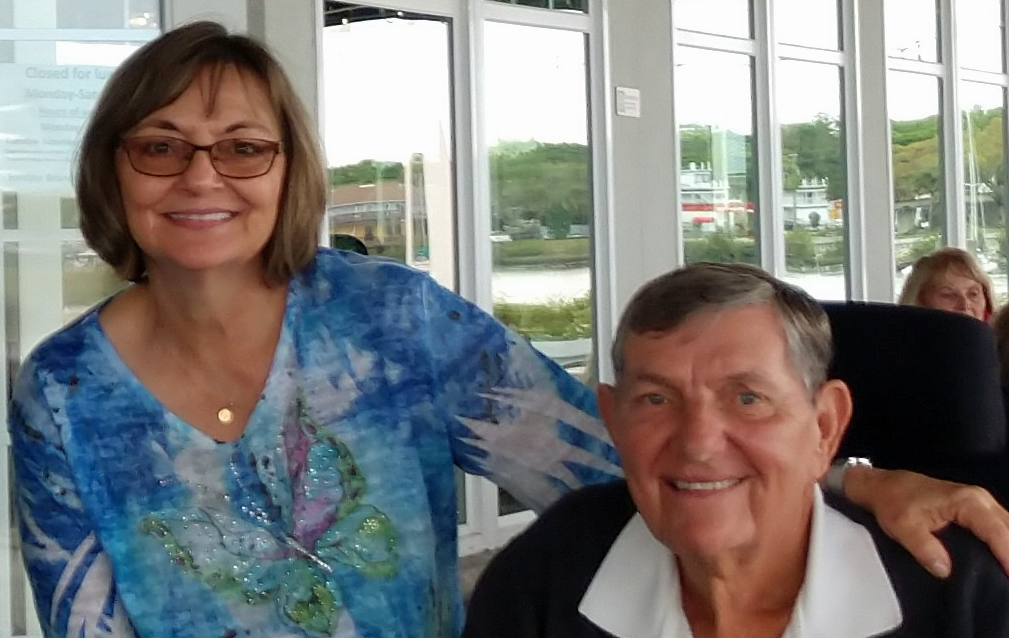Larry Leisher had no idea what inclusion body myositis (IBM) was when he was diagnosed with this slowly progressive muscle disease 16 years ago. He’d been having trouble going up and down the stairs for a while before that. His legs were looking very thin, and he was falling too often for it to be normal. When the diagnosis came, it threw Larry and his wife JoAnn for a loop.
“The biggest problem was not having any idea where it came from or how it started,” Larry says. “I’d never really been a sick person, so to have this come upon me the way it did was really devastating for both JoAnn and me.”
The Leishers are not alone in feeling confused and overwhelmed. Being diagnosed with a rare, chronic condition, especially one like IBM that has no treatments, can be one of the most difficult and stressful life experiences, for both the patient and her or his partner. Suddenly, a spouse becomes a caregiver and the life they thought they were living has been upended. Plans for the future, work and social life, and relationships all have to be retooled to include medical interventions and disability. None of that is easy.
About a year into his diagnosis, Larry ran across an article in the local paper written by Lee Thames, the first person Larry ever heard of who had IBM. So he called him.
“Lee and I got together and decided to start a support group,” Larry says. “At first it was just he and I. Our first meeting was in February of 2007, and it’s been going ever since.”
Getting together with other people who also live with myositis can be a life saver. It’s a way to learn more about this condition that most people have never heard of before. And because no one else in your life really knows what you’re going through, sharing the story of your journey with someone else who understands the challenges of living with this life-changing disease can lighten the load, whether you’re the patient or the caregiver.
Over the years, the myositis support group Larry helped to start in Jacksonville has grown to include 20-25 people, both patients and their caregivers. Eventually they connected with The Myositis Association (TMA) and became an official part of the organization’s national network of support groups.
Before the pandemic ended in-person meetings, they would try to get together quarterly. Larry arranged for speakers to come in and talk with the group about different aspects of their disease.
“A support group is a good thing to have,” Larry says. “It gives hope to those who have none. It gives people a chance to talk with others who have the same difficulties. We talk about things that get us through the day, things that you can’t just turn on the computer and find.”
But it’s not just about the meetings. Larry works hard to make sure members of his group are taken care of. He calls everyone every few weeks, just to check in. And pre-pandemic, he and another member, Jim Farrlley, would also get in the car and drive as far as 70 miles to visit members who were no longer able to make it to meetings.
These efforts have paid off. Before the pandemic, the group was so connected that, even after their loved one passed away, a couple of caregivers still attended in-person meetings. And more than one member continued with the group even after their doctor decided they didn’t have myositis after all.
Like everything in our lives over the last year or so, however, the social distancing has made it difficult for members to be there for each other. While many events have moved online through video meeting apps like Zoom, that hasn’t been an option for the Jacksonville group. Too many of the members are unfamiliar and uncomfortable with this technology, and some don’t have access to a computer.
So Larry has been on the phone a lot. He calls members weekly or biweekly, just to let them know they’re still part of a supportive community that cares about them and to keep them abreast of what’s going on at TMA and in the myositis research world.
“It’s been hard since we can’t get out to visit people,” Larry says. “So I just try to keep the conversations going. A lot of people are disappointed because we’re no longer getting together. Things are getting more and more difficult for folks…problems at home and such.”
More than anything, Larry has an unwavering positive attitude. He is committed to his mission of passing on hope to folks who may be feeling even more lost and alone than in normal times.
Recently, for example, a report on arimoclomol, a new medication being tested for IBM, showed the drug had failed to meet research expectations in clinical trials. It was devastating news for IBM patients who had pinned all their hopes on this, the only drug anywhere close to being a possible therapy for their disease.
“I contacted our members who have IBM and let them know about the results,” Larry says. “But I also let them know that, although it failed, this was not a time to give up. We still have to have hope. We still have to support the research and TMA.”
In the end, this optimistic attitude and sharing it with others keeps him going too. He refuses to let this disease take him down.
“I don’t want to lose the group,” Larry says. “Even if it’s shrinking in size, I still feel that, between our group and TMA, there’s a lot of hope that can be passed around.”
